Analytical Science Leaders and More Honored at 137th AOAC Annual Meeting
AOAC is recognizing hundreds of scientists for their contributions to the Association and the analytical community at the 137th AOAC Annual Meeting and Exposition in New Orleans, Louisiana, USA, on August 28, 2023. AOAC awards honor scientific excellence across the spectrum of Association activities, including methods development, expert review panels (ERPs), technical service, scientific papers and editorial contributions, and student engagement.
AOAC congratulates all the winners of the 2023 AOAC awards!

Presented to: Michelangelo Anastassiades, CVUA Stuttgart-European Union Reference Laboratory for Pesticides Requiring Single Residue Methods (EURL-SRM), Stuttgart, Germany
AOAC INTERNATIONAL is proud to present the 2023 Harvey W. Wiley Award, the Association’s highest honor for lifetime scientific achievement, to Michelangelo Anastassiades. He joined the CVUA Stuttgart in 1994 and has been working in the field of pesticide residues ever since. From 2000 to 2002, Anastassiades worked as a visiting scientist at the Eastern Regional Research Center of the U.S. Department of Agriculture. He returned to the CVUA Stuttgart in 2002 and has been heading the EURL-SRM, which is funded by the European Commission (EC), since 2006. The duties of the EURL include development of methods, organization of proficiency tests, technical assistance to the EC and European Food Safety Authority, as well as trainings and workshops for National Reference Laboratories of EU Member States.
Anastassiades’ most significant contribution to the development of standards and methods is an analytical approach called QuEChERS (pronounced “kechers”), which stands for quick, easy, cheap, effective, rugged, and safe. It is an extraction process for testing for most pesticide residues and their metabolites. The QuEChERS method led to the development of two important official methods for pesticide residue analysis: EN 15662 and AOAC Official MethodSM 2007.01.
Anastassiades is currently examining ways to cover 20-25% of pesticides and pesticide metabolites not amenable to the basic QuEChERS method. This entails finding analytes with similar properties and grouping them as much as possible under the same basic techniques. In addition, many labs have expanded QuEChERS to include other classes of compounds for subsequent quantification.
Anastassiades received his Ph.D. at the University of Hohenheim/Germany in 2001, with a thesis on the analysis of pesticide residues using supercritical fluid extraction.
The Harvey W. Wiley Award is presented each year to a scientist, or group of scientists, who has made an outstanding contribution to analytical methodology in an area of interest to AOAC INTERNATIONAL. The award consists of US$5,000, an award plaque, and reimbursement of travel expenses incident to attending the AOAC Annual Meeting and Exposition.

Presented to: Susan Audino, S. Audino & Associates, LLC, Bethany Beach, Delaware, USA
Susan Audino is a chemist/chemometrician and independent consultant to chemical and biological laboratories. She is currently the science advisor for the AOAC Cannabis Analytical Science Program (CASP).
As a contractor for accreditation bodies, Audino assesses laboratories and is an instructor for ISO/IEC standards, including ISO/IEC 17025. She serves on the Board of Trustees for Hood College in Frederick, Maryland, USA, and Board of Directors for Research on Environmental Medicine in Maryland. She has also been a member of working groups and expert review panels to develop and evaluate analytical consensus methods. In addition, Audino has been an active member of advisory panels resulting in published industry guidance, including Purity-IQ standards, NCIA Guide for Laboratory Testing, and ACIL Guidance for Cannabis Laboratories. She is a contributing author to Cannabis Laboratory Fundamentals, published by Springer-Nature in 2021.
Audino advises and mentors junior scientists in several cannabis testing laboratories. She has served on the faculty of the Teachable Medicine and for Society of Cannabis Clinicians.
Recognized as an industry leader, Audino has been an invited speaker at numerous domestic and international conferences and has consulted domestic and international laboratories, regulatory bodies, and governments.
She is principal of multiple independent companies and holds several personal/independent patents pending.
The Fellow of AOAC INTERNATIONAL award recognizes the dedication and commitment of volunteers who have served the Association for at least 10 years.

Presented to: Anton Kaufmann, Kantonales Labor Zürich, Fachhochschule Burgdorf, Switzerland for “Improving the QuEChERs Liquid/Liquid Extraction of Analytes with Widely Varying Physicochemical Properties: Example of 201 Veterinary Drugs in Milk” by Kaufmann, A., Butcher, P., Maden, K. Walker, Stephan, Widmer, M. (2022) J. AOAC Int. 105, 1030-1042.“
Anton Kaufmann is currently employed at the Official Food Control Authority of the Kanton of Zürich in Switzerland, where he is responsible for a group that focuses on veterinary drug residues and, recently, PFAS analysis. He has about 30 years of experience in food analysis, which involves instrumental analysis of wine including the application of chemometric techniques to elucidate the geographical origin of wine.
His current work focuses on multiresidue methods for veterinary drugs in animal tissues using state-of-the-art technology, such as ultra-performance liquid chromatography and high-resolution mass spectrometry (HRMS; TOF and Orbitrap), as well as ion mobility. In addition to development of new analytical methods, Kaufmann has examined technical aspects related to LC-MS (signal suppression, ionization phenomena, structural elucidation by HRMS, alternative method validation approaches, and nontargeted detection strategies).
He is the author of about 80 peer-reviewed scientific papers and four book chapters.
The Best Manuscript Award recognizes the most outstanding original and creative article published in the peer-reviewed Journal of AOAC INTERNATIONAL in the calendar year.
Presented to: AOAC Southern Section
AOAC INTERNATIONAL is pleased to announce the AOAC Southern Section as the recipient of the Section of the Year Award. The Section is being recognized for facilitation of multiple activities throughout the year, communication across various platforms, recruitment, and service to the Association.
The Southern Section continues to grow and is managed by a dedicated group of thought leaders, who are instrumental in its success and efficient operation. The Section fosters valuable connections to regional authorities, such as the U.S. Food and Drug Administration, U.S. Department of Agriculture, and Centers for Disease Control and Prevention, as well as academia, providing a platform for young researchers.
The Southern Section continues to offer a sound scientific program for its annual meetings, which are always well-attended. In addition, Section meetings are well-sponsored due to the Section’s good relationship with vendors.
The use of social media has been effective in the Section’s communications to encourage engagement of membership and promote a series of technical webinars.
Section members participate in AOAC standards development activities and other initiatives. The Section continues to actively recruit individual and organizational members for AOAC INTERNATIONAL.
The award recognizes the role AOAC Sections play in advancing analytical excellence in the areas of food safety, food integrity, and public health.

Presented to: Amit Chandra, Amway Research and Development, Ada, Michigan, USA
Dr. Chandra joined AOAC in 2000 and is a member of the Technical Division for Laboratory Management (TDLM) and the Technical Division on Reference Materials (TDRM). During his membership tenure at AOAC, Dr. Chandra has served on the Editorial Board, Stakeholder Panel on Strategic Food Analytical Methods Program, AOAC Methods Committee on Dietary Supplements (Committee K), and on the AOAC Technical Programming Council. Chandra served on numerous panels and submitted various posters at the AOAC Annual Meeting and Exposition.
Since 2017, he has served as a volunteer to help organize and facilitate the poster contest. A champion for students and new researchers, Amit has been outspoken about providing opportunities for recognition. He has volunteered his time to organize the poster contest at the Annual Meeting including recruiting volunteer judges and facilitating the entire judging process. He truly cares about students and new researchers, and it shows in the time and effort he takes to ensure this program is a success.
Dr. Amit Chandra is a Distinguished R&D Scientist and Fellow Botanical Strategy and Innovation at Amway R&D. He is past head of the Chemistry, Forensic Investigations and Microbiology Dept., of Innovations and Sciences Division., at Amway Corporation. In addition, he also serves as a “Fellow of AOAC INTERNATIONAL” for his meritorious service to the organization.
The Special Recognition Award is in recognition of his dedication and support of AOAC INTERNATIONAL.
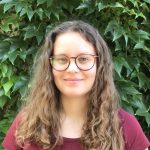
Presented to: Rosalie Ormos, Universities of Stuttgart and Hohenheim, Germany
Rosalie Ormos, recipient of this year´s AOAC Harvey W. Wiley Scholarship, is currently pursuing a Ph.D., with a focus on isolating and characterizing rare minor lipid compounds, while actively contributing to undergraduate training and participating in professional societies. She excelled in her bachelor’s and master’s studies in food chemistry, jointly offered by the Universities of Stuttgart and Hohenheim. She displayed exceptional enthusiasm and success, particularly in instrumental analytical chemistry and practical food analysis courses. For her master’s thesis, Ormos developed a novel sterol enrichment method using countercurrent chromatography in the reversed co-current mode. Her work earned her recognition, including an oral presentation at this year´s regional conference of Food Chemistry and a published paper (https://doi.org/10.1007/s00216-023-04766-9).
The Harvey W. Wiley Scholarship (US$1000) is awarded to an upper-level undergraduate or graduate student to encourage and assist studies in the analytical sciences. The Harvey W. Wiley Award winner can nominate a student to receive the scholarship. Scholarship selection is based on criteria established by AOAC.

Presented to: Yigong Guo, The University of British Columbia, British Columbia, Canada
Yigong Guo is a Ph.D. candidate at the University of British Columbia, who has demonstrated exceptional academic and research abilities. Currently, he is conducting research focusing on buccal delivery of nanoencapsulated insulin, aiming to replace subcutaneous insulin injections for diabetic patients. His research garnered global media attention for its potential to improve the lives of patients relying on protein-based therapies. Guo has published 17 manuscripts, including collaborative projects, during his Ph.D. studies. He is dedicated to helping others develop and test new products.
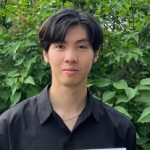
Presented to: Hieu Le, Carleton University, Ontario, Canada
Hieu Le, a Vietnamese student studying in Canada, recently graduated from Carleton University with an Honors degree in Computational Biochemistry. He is currently pursuing the application of data analysis in biochemical fields, such as metabolomics.

Presented to: Shandry Tebele, University of Cape Town, Cape Town, South Africa
Shandry Tebele is a Ph.D. candidate in the Department of Molecular and Cell Bioloy at the University of Cape Town. Her research project predominately focuses on the microbiome and metabolome of the resurrection plant Myrothamnus flabellifolia under drought stress. Her research interest has been driven by promoting sustainable agriculture through implementation of innovative strategies. Tebele is characterizing microbes associated with the roots, rhizosphere, and bulk soil of M. flabellifolia using metagenomic sequencing and metabolic profiling using GC-MS. Furthermore, she is using an emerging high-throughput technique called metatranscriptomics to analyze the expressed microbial genes under drought stress. Most of her research work has been published in peer-reviewed and accredited journals with high impact factors. Tebele won the AOAC Sub-Saharan Africa Section’s Young Scientist Award in 2019 during her MSc program.
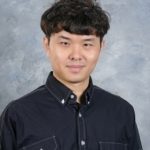
Presented to: Zhihan Xian, University of Georgia, Griffin, Georgia, USA
Zhihan Xian is a Ph.D. candidate at the University of Georgia’s Center for Food Safety. His research focuses on the application of food microbiome profiling in food authenticity analytics and whole genome sequencing (long and short reads) in subtyping of foodborne pathogens. Xian obtained a BS in Food Science with a minor in Computer Science from the University of Maryland.

Presented to: Yaqi Zhao, Florida State University (FSU), Tallahassee, Florida, USA
Yaqi Zhao is a Ph.D. candidate in the Food Science Program at FSU. She joined the FSU Food Safety and Quality Laboratory in 2019. Her research interests focus on rapid detection of food allergens and protein characterization using immunochemistry. Zhao obtained her MS degree in 2021.
The award, supported by contributions from the Eurofins Foundation, is designed to encourage student researchers who are advancing basic or applied science in analytical or molecular testing for food safety, food security, food defense, food authenticity, or health and environmental protection.
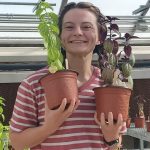
Presented to: Ellie Abraham, The Pennsylvania State University, State College, Pennsylvania, USA
Ellie Abraham is a fifth-year Ph.D. student studying Plant Biology at Penn State. Her research focuses on building practical and reliable chemometric workflows for herbal product studies. With a primary interest in botanical authentication and safety, her studies have utilized the natural variation in Ocimum (basil) to build predictive models for consumer-available product identification via metabolomic and genomic approaches. Abraham’s research is supported by an NIH-NCCIH F31 predoctoral fellowship and a 2021 Garden Club of America Anne S. Chatham Fellowship in Medicinal Botany.
Abraham’s passion for teaching others about botanical safety is also demonstrated through content writing and marketing for Eurofins Botanicals, where she contributes to online blogs and gives guest lectures at multiple Penn State campuses.

Presented to: Pushpa Deore, Vasantdada Sugar Institute (VSI), Maharashtra, India
Pushpa Deore is a Ph.D. Scholar at VSI associated with Savitribai Phule Pune University. She is currently working under the supervision of R.M. Devarumath from VSI and Anuradha Upadhyay and Ahammed Shabeer T.P. from Indian Council of Agricultural Research-National Research Center for Grapes.
Deore’s doctoral dissertation focuses on “Pesticide Effect on Grape Phyllosphere Microbiome Dynamics Regarding Grape and Wine Quality,” which integrates molecular, analytical, microbiological, and biochemical approaches. The project provided valuable insights on potential biomarkers identification, which could be a useful tool for organic produce authentication. The pathways affected could help to understand pesticide interaction with grape metabolome with the quality estimation. The microbial diversity of grapes observed during metagenome analysis will help to develop strategies for improving the ecosystem. Novel pesticide-degrading isolates identified in the study could be exploited for the bioremediation of pesticides.
Deore previously worked as a grape breeder and molecular biologist, where she developed expertise in molecular and analytical techniques regarding plant protection and improvement, which benefits the farming community. Her research work has been presented on national and international platforms and received many recognitions.
Deore obtained a master’s degree in agriculture specializing in Plant Biotechnology from Anand Agricultural University in India.
The student scholarship, supported by contributions from Herbalife, is designed to encourage student researchers who are advancing analytical or molecular (DNA) testing.

Presented to: Hassan Zia, University of Ljubljana, Berlin, Germany
Hassan Zia is currently enrolled as a Ph.D. scholar at the University of Ljubljana in Slovenia, conducting doctorate research as a visiting researcher at Gesellschaft für Lebensmittel-Forschung mbH in Germany. The Ph.D. project, HiStab Juice, is funded by the European Horizon 2020 and involves collaboration among 17 organizations (seven academic and 10 nonacademic) from seven countries across Europe. Zia’s research focuses on state-of-the-art instrumental analysis techniques to develop and validate multivitamin analysis methods for fruit juices.
Zia obtained a master’s degree in Food Science and Quality from ETH Zürich in Switzerland in 2020 and a B.Sc. in Food Engineering with a minor in Industrial Engineering from Middle East Technical University in Turkey in 2018. The master’s thesis was conducted at the Nestlé Dairy Research Institute in Switzerland, where Zia worked on biotechnological production of dairy flavor-inducing lactones to improve the flavor profile for dairy alternatives offered by Nestlé. Zia received the distinguished Marie-Curie Ph.D. scholarship award in 2021.
The award, supported by contributions from SCIEX, is designed to encourage the integration of graduate students into AOAC INTERNATIONAL, with a focus on candidates with demonstrable potential to become thought leaders and scientific influencers in their respective fields.
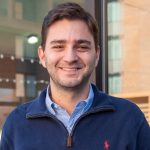
Presented to: Andres F. Ortega, Cornell University, Ithaca, New York, USA
Andres Ortega is a Ph.D. candidate mentored by Mike Van Amburgh, whose group works to further develop the Cornell Net Carbohydrate and Protein System (CNCPS). CNCPS is a nutritional model used by dairy farmers around the world to formulate cattle diets and predict productive performance. Ortega’s research focuses on amino acids (AA), the building blocks of protein composed of nitrogen (N). During his graduate program, Ortega used standard reference materials to develop a novel method to analyze the AA composition of different substrates using HILIC and liquid chromatography-tandem mass spectrometry to better characterize the chemical composition of various model components. The method will be used to examine how nonessential AA in diet formulation can improve dairy cattle productive efficiency, which can result in less N excreted into the environment and lower feed costs for farmers.
In the long term, Ortega is interested in gaining experience with other, more complex analytical techniques necessary to investigate nutrient utilization and metabolism in any animal.
The AOAC INTERNATIONAL Inés Cereijo Technical Division on Reference Materials (TDRM) Award is offered annually to both undergraduate and graduate students at any college or university to support students promoting awareness of the need for method performance evaluation early in a chemist’s career, using reference materials.

Presented to: John Szpylka, Retired, San Antonio, Texas, USA
John Szpylka, retired, is selected as the recipient of the Technical Service of the Year Award for his significant contributions to AOAC. He served as president of the AOAC Board of Directors from 2022 to 2023 and was previously president-elect and secretary. He was also president of the AOAC Midwest Section.
Szpylka is a past chair of the AOAC Official Methods Board and currently chairs several AOAC committees, including the Food Authenticity Methods (FAM) Program Working Group on Non-Targeted Testing, Analytical Laboratory Accreditation Criteria Committee (ALACC), ALACC Subcommittee on Chemistry, and the Expert Review Panel (ERP) on Food Allergen Methods. Szpylka is also a member of the executive committees for the AOAC Technical Division on Reference Materials (TDRM) and Technical Division for Laboratory Management (TDLM) and several stakeholder programs, ERPs, and working groups.
He holds a Ph.D. in Analytical Chemistry from The Ohio State University.
Presented for: Journal of AOAC INTERNATIONAL–Special Guest Editor Section on “Green and Roasted Coffee Authentication: Species, Origin, and Diluent Methods of Analysis”

Special Guest Editor: Brian Schaneberg, Institute for Food Safety & Health, Bedford Park, Illinois, USA
Contributing Authors: Duncan Thorburn Burns, Michael J. Walker, Dapeng Zhang, Fernando E. Vega, Francisco Infante, William Solano, Elizabeth S. Johnson, Lyndel W. Meinhardt, Solène Pruvot-Woehl, Sarada Krishnan, William Solano, Tim Schilling, Lucile Toniutti, Benoit Bertrand, Christophe Montagnon, Xiuju Wang, Loong-Tak Lim, Yucheng Fu, Dirk W. Lachenmeier, Jan Teipel, Andreas Scharinger, Thomas Kuballa, Stephan G. Walch, Franziska Grosch, Mirko Bunzel, Alex O Okaru, and Steffen Schwarz
Special guest editor and contributing authors for the special section on “Green and Roasted Coffee Authentication: Species, Origin, and Diluent Methods of Analysis” are selected as the recipients of the Award in Recognition of Technical and Scientific Excellence for their contributions to the Journal of AOAC INTERNATIONAL. This special section defines state-of-the-art research for the identification of coffee species and other properties using a variety of analytical techniques. The work obtained numerous citations and views, which increased the outreach of J. AOAC Int. to a broader audience.
Presented to: AOAC ERP for Stakeholder Program on Infant Formula and Adult Nutritionals (SPIFAN) Nutrient Methods

ERP Chair: Darryl Sullivan, Eurofins Scientific, Poynette, Wisconsin, USA
ERP Members: Sneh Bhandari, Consultant; Sean Austin, Esther Campos-Giménez, Christophe Fuerer, Société des Produits Nestlé S.A.; Hans Cruijsen, Martine van Gool, FrieslandCampina; Brendon Gill, Fonterra Cooperative Group; Estela Kneeteman, Instituto Nacional de Tecnologia Industrial; Karen Schimpf, Philip Haselberger, Abbott Nutrition; Melissa Phillips, Catherine Rimmer, NIST; Maria Ofitserova, Pickering Laboratories; Thomas Vennard, Shay Phillips, Reckitt; Yannis Vrasidas, Consultant; David Woollard, Consultant; and Jinchuan Yang, Waters Corp.
The AOAC ERP for SPIFAN Nutrient Methods is selected as ERP of the Year based on its high level of activity and review of numerous methods urgently needed in the infant formula community. The ERP has been highly active since its inception in 2011. In 2022 alone, the ERP met three times and reviewed 12 methods, leading to the adoption of seven methods for AOAC First Action status. In addition, to encourage resubmission of methods that did not advance to First Action Official MethodsSM status, the ERP is actively engaged in providing method authors with detailed feedback and recommendations to help methods advance successfully through the AOAC Official MethodsSM process.
Presented for: AOAC Official MethodSM 2020.07 Measurement of Available Carbohydrates in Cereal and Cereal Products, Dairy Products, Vegetables, Fruit, and Related Food Products and Animal Feeds

Method Authors: Barry V. McCleary, FiberCarb Consultants; Ciara McLoughlin and Vincent A. McKie, Neogen Corp.
The AOAC ERP for Dietary Starch and Fiber Methods recommended AOAC Official MethodSM 2020.07 for Final Action status, which was approved in 2022. Traditionally, carbohydrates are calculated by difference from other determinations of protein, fat, moisture, ash, alcohol, etc. from the total weight of the food, and total available carbohydrates are estimated by the subtraction of dietary fiber. The method accomplished a procedure for direct determination of available carbohydrates by specific determination of digestible starch, maltodextrins, maltose, isomalto-oligosaccharides, isomaltose, sucrose, lactose, glucose, fructose, and galactose in a variety of food matrices [Journal of AOAC INTERNATIONAL Vol. 106, No. 2, pp 370–383(2023)].
Presented for: AOAC Official MethodSM 2021.08 Assurance® GDS for Cronobacter Tq II in Infant Formulas, Infant Cereals, Ingredients, and Environmental Samples

Method Authors: Andrew Lienau, MilliporeSigma; M. Joseph Benzinger Jr., Benjamin Bastin, Erin Crowley, Kateland Koch, and Wesley Thompson, Q-Laboratories
Cronobacter infections are an emerging opportunistic foodborne pathogen particularly concerning infants. Cronobacter can remain viable for long periods in low-moisture foods, and outbreaks associated with dry foods have occurred in infant formula, infant cereal, powdered milk, herbal teas, and starches. AOAC Official MethodSM 2021.08 Assurance® GDS for Cronobacter Tq II (GDS Cronobacter) assay is an automated nucleic acid amplification system for the detection of Cronobacter in infant formulas, infant cereals, ingredients, and environmental samples [Journal of AOAC INTERNATIONAL Vol. 106, No. 3, pp 711–724(2023)].
The AOAC OMB awards recognize significant contributions and meritorious volunteer service to the AOAC analytical sciences community.
Jake Carter, US Food and Drug Administration: The Oh-Fish-Al Method for Measuring Methylmercury in Seafood
Sarah Dowd, Waters Corporation: Translating Methods from Helium to Nitrogen Carrier Gas for Multi-Residue Pesticide Analysis with GC-APCI-MS/MS
Alejandro Garrido-Maestu, International Iberian Nanotechnology Laboratory: Multiplex Loop-mediated isothermal amplification method for the detection of viable Listeria monocytogenes implementing a competitive Internal Amplification Control
Autumn Phillips, Inorganic Ventures: Analysis of Cannabis Products for Arsenic, Cadmium, Mercury and Lead by ICP-OES: Meeting the Detection Limits Challenge
Mengliang Zhang, Middle Tennessee State University: Development of the Online Database for the Metabolite Profiles in Botanicals
25 YEARS
Davidson, Stephen
Imatachi, Emi
Jackson, Mike
Johnson, Ronald
Lorman, Trevor
McMahon, Wendy
Moriyama, Takatoshi
Ng, Eunice
Papastephanou, Chara
Trujillo, Socrates
30 YEARS
Araki, Emiko
Benesh, DeAnn
Lehotay, Steven
McCleary, Barry
OConnell, Dan
Rimkus, Gerhard
Weitzel, M.L. Jane
35 YEARS
Abara, Okey
Burns, Gordon
Danielson, James
Klein, Harvey
Kramer, Melvin
Wehner, Teresa
40 YEARS
Brodsky, Michael
Coleman, Mark
Goto, Tetsuhisa
45 YEARS
Walsh, Máire